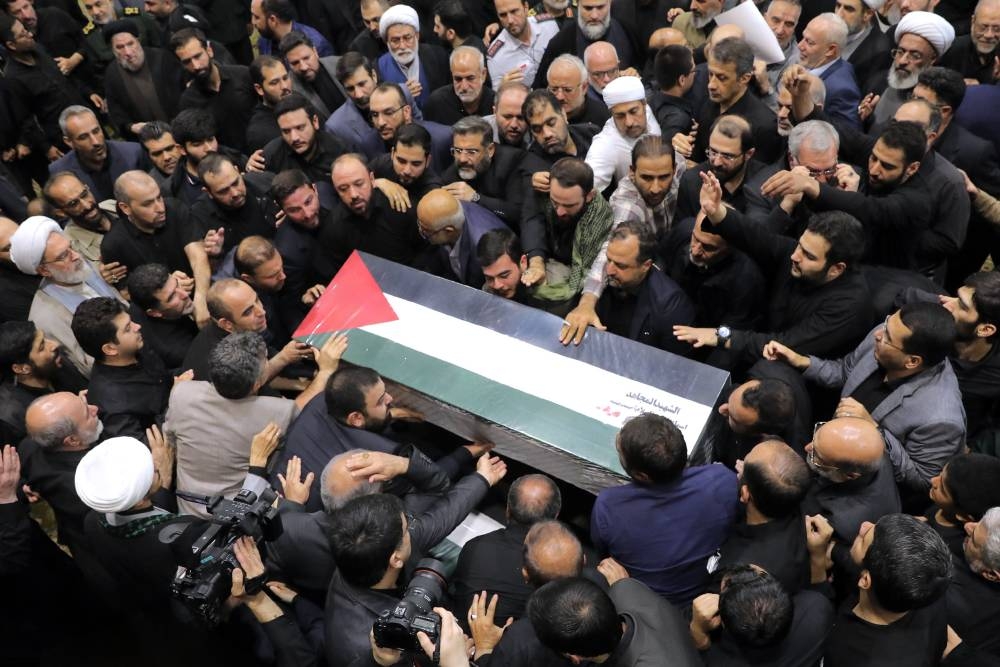Haniyeh, spoken of as Tehran’s ‘guest’, was assassinated in the Iranian capital as Israel’s war on Gaza rages.
Tehran, Iran – Thousands poured into the streets of Tehran to join the funeral procession of Hamas leader Ismail Haniyeh as Iran weighs its options having promised to avenge his assassination.
The bodies of the Palestinian political official and his bodyguard, who was killed alongside him a day earlier in Iran in a strike blamed on Israel, were marched amid chants in the capital.
Flags of Palestine, Lebanon’s Hezbollah and Hamas swayed in the wind as organisers handed out posters of Haniyeh. Banners honoured the Palestinian leader and the late Iranian general Qassem Soleimani who was assassinated by the United States in 2020, among others.
“Avenging the blood of the guest is with the host, the world is waiting,” read the headline of the ultraconservative Keyhan newspaper, whose editor-in-chief is appointed by the supreme leader.
Other top daily newspapers followed the themes of revenge, defiance and bereavement.
“We must give a strong response to Israel, anything less would make many people unhappy,” 46-year-old Hamid Hajian, who attended the funeral procession, told Al Jazeera.
“It looked like there might be a ceasefire deal for Gaza but that’s over now. Talking is not helping, I hope Iran gives a stronger response than last time,” he said, referring to the April 14 attack on Israel in retaliation for an air attack on Tehran’s consulate in Syria.
Iran’s top authorities have promised “harsh” retaliation for the killing of its “guest”.
Haniyeh was assassinated hours after Iranian President Masoud Pezeshkian’s inauguration ceremony.
A red flag was hoisted above the Jamkaran Mosque in the holy Shia city of Qom south of Tehran to reflect the promise of blood. The Milad Tower in Tehran, an iconic building in the capital, was lit up in red overnight.
Mohammad Bagheri, the chief of staff of Iranian armed forces, suggested on Thursday that the response could come as part of a coordinated effort with the so-called “axis of resistance”, a regional network of armed groups that Tehran supports.
Haniyeh ‘hit directly’ with missile
Khalil al-Hayya, the deputy head of Hamas in the Gaza Strip, told reporters at a news conference in Tehran late on Wednesday that “a missile entered the room” of Haniyeh and killed him and his bodyguard in an attack that “directly” hit the floor of the building where he was staying.
An image released late Wednesday by Sabereen News, an outlet affiliated with the Islamic Revolutionary Guard Corps (IRGC), claimed to show the site of the assassination. It showed a multistorey building partly covered with a black tarp that appeared to have sustained damage to two floors. Al Jazeera was unable to independently verify the image.
The guesthouse was in the Saadabad Palace Complex area in north Tehran, where foreign dignitaries are hosted and where Iranian presidents welcome heads of state on official visits.
Iranian officials have not confirmed the details of the assassination. They have so far only reported that a guided “airborne projectile” targeted Haniyeh’s residence.
An analyst interviewed by Iranian state media said Haniyeh was likely tracked since he was using the same SIM card he did outside Iran.
‘Things are happening so fast’
As the spectre of all-out war continues to creep over the region, some in Iran are also concerned about the conflict expanding.
“I hope it won’t escalate much further and I believe we’re still not at the point of direct war, but a lot of it could depend on Iran’s response as well,” said a 24-year-old woman in Tehran who asked not to be named.
“If Iran’s attack kills Israelis, then it’s dangerous, because the Israelis are bloodthirsty,” she told Al Jazeera.
Israel has not offered any comment on the assassination, but after the October 7 incursion into southern Israel, which was led by the group and during which 1,139 people were killed, Israeli officials promised to kill Haniyeh and other Hamas leaders as part of a stated aim to crush the group.
The United States, which has said it had no knowledge of the attack on Haniyeh, has reportedly urged Iran, via intermediaries, against striking at Israel, something Iran has rejected emphatically.
Meanwhile, markets in Tehran initially reacted with concern.
The stock market experienced a fall on Wednesday, with the benchmark index of the Tehran exchange finishing 2 percent lower than a day earlier as Iran headed into the weekend.
The national currency, the rial, also slipped by about 3 percent to stand above the 600,000-mark for each US dollar.
But after years of weathering turbulence ranging from US sanctions to fears of war, the markets are not expected to be shaken up much further. That could all change, though, if an all-out conflict takes hold.
Ali, a 31-year-old data analyst from the capital, does not expect such a scenario.
“Things are happening so fast, just this year we’ve been through stuff that some might not experience in a lifetime. But I think Iran and Israel will probably hit some military targets and avoid wider war.” AL JAZEERA
By Maziar Motamedi








